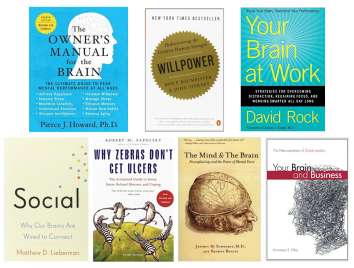7 Best Books on Neuroscience for Coaches
 Neuroscience has entered the coaching and leadership development conversation in a big way. The advent of the functional MRI machine has allowed neuroscientists to get a much better picture (literally) of what goes on in the brain under different circumstances.
Neuroscience has entered the coaching and leadership development conversation in a big way. The advent of the functional MRI machine has allowed neuroscientists to get a much better picture (literally) of what goes on in the brain under different circumstances.
This new capability has given learning, leadership, and talent development professionals added insight into ways to bring out the best in people by identifying what lights up different areas of the brain.
Ready to take the plunge and learn more about this fascinating new field? Here’s a short list of books that will help you get up to speed.
The Owner’s Manual for the Brain by Pierce J. Howard
This book provides a great overview and is an encyclopedia on all things having to do with your brain. It is very well organized, super clear, and chock full of resources including additional reading and websites. Content includes nice coverage of brain basics, human development, wellness, learning, creativity, and more. If you only have one book on the brain, this should be the one.
Why Zebras Don’t Get Ulcers by Robert M. Sapolsky
More than just a charming cover with cavorting zebras, this book focuses on the toll that modern-day stressors are taking on our brains and our bodies. We all know about the fight-or-flight response—but what we don’t know is that our brains can’t tell the difference between a grizzly bear charging toward us and a cranky boss. As a result, many people in today’s organizations are in a constant state of alarm. Sapolsky is down to earth, funny, and gifted at helping the layperson understand the ins and outs of managing our own brains under stress.
The Mind and The Brain by Jeffrey Schwartz and Sharon Begley
An early entrant into the neuroscience fray, this book is a valiant attempt to help us understand how we can harness the power of our brains to improve our quality of life. Schwartz, a UCLA psychiatrist, and Begley, a Wall Street Journal science columnist, look at new treatments being developed for brain trauma and dysfunctions and what it teaches us about the brain’s ability to adapt.
Your Brain and Business by Srinivasan Pillay
I had the great good fortune to meet Dr. Pillay, and there simply isn’t a more interesting or kinder person. He has about 90 irons in the fire at any given moment but has somehow found time to write several books. This one, focused on leadership and workplace issues, explains how brain processes affect behavior and how knowing this is helpful to leaders. Dr. Pillay is often—if not always—able to express complex concepts in a way that a person with a normal IQ can get them.
Willpower by Roy Baumeister and John Tierney
I stumbled over Baumeister and Tierney’s writing in The New York Times Sunday magazine and it rocked my world. They explore and explain the notion of decision fatigue, which is extremely important to know about because when our ability to think properly is exhausted, we are unaware of it. When our muscles give out, it is obvious to us—but when our brains give out, it is less apparent. When that happens, we can unwittingly make terrible decisions, lose self-control, and do things we regret simply because we are tired. This book will help you understand the fundamentals of self-management.
Your Brain at Work by David Rock
Rock is a pioneer in the area of putting neuroscience discoveries together with leadership research. He claims the coining of the term neuroleadership and has a training and coaching organization devoted to same. His book is a fun read if not an entirely easy one—he uses a theatre metaphor with different parts of the brain represented by The Director or Actors. This metaphor is especially relatable to some (like me, a former actor) and not so much to others. Rock’s most notable contribution to the field is his acronym SCARF, which represents dimensions that the brain is particularly sensitive to: Status, Certainty, Autonomy, Relatedness, and Fairness.
Lieberman is extremely accessible in person. His book is somewhat less so. Written by and for people with advanced degrees, it can be a slog—but his research is important. He and his wife, Naomi Eisenberger, have focused on the science of why humans are so dependent on each other for their well-being. The two have proposed the scientific underpinnings for the truth that “no man is an island.” For a quick taste of their critical work on why rejection hurts so much, click here. Lieberman’s book is for the nitty gritty reader.
That’s my list—what would you add? What have been your favorites? Please do share in the comments section below.
About the Author

Madeleine Homan Blanchard is the co-founder of The Ken Blanchard Companies’ Coaching Services team. Since 2000, Blanchard’s 150 coaches have worked with over 14,500 individuals in more than 250 companies throughout the world. Learn more at Blanchard Coaching Services. And check out Coaching Tuesday every week at Blanchard LeaderChat for ideas, research, and inspirations from the world of executive coaching.
